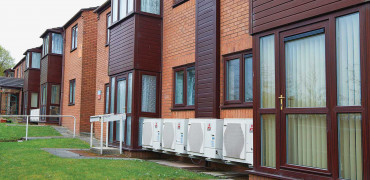A perfect storm of inflation at a 30 year high, tax increases looming and a huge rise in the energy price cap are combining to make the best case ever for investing in improving home insulation and installing heat pumps.
The households that would benefit most from targeted investment are already struggling with their bills, but from April their financial situation is likely to get a whole lot worse.
Sadly they are also living in the coldest and dampest properties, which are the most difficult to heat and keep warm. That is of course assuming they can afford to turn their heating on.
Low income households will now spend 18% of their income on energy bills
Experts’ predictions
The energy regulator Ofgem is due to announce the level of the summer price cap on or about the 7th February with the new rates payable from 1st April. We don’t yet know how much prices will rise by – except we know they will rise because all of the experts are telling us they will and the digital and print media are full of horror stories about the energy market every day.
Rises of between £600 and £1,000 a year for average consumers are being forecast and those sorts of figures are instilling dread in households that are already struggling to meet their current bills.
Low-income households are rarely paying for their fuel by direct debit, so they are penalised by having to pay higher rates for using prepayment cards or other payment methods. They also haven’t been applying in their droves for any green grants or loans to decarbonise their homes.
Safety nets withdrawn
During the pandemic rent arrears in both the social rented and private rented sectors have soared. The Government protected low income families to a degree with bans on evictions (for all but the most egregious examples of anti-social behaviour and domestic violence) but those protections have recently come to an end and the temporary Universal Credit uplift was also withdrawn.
New analysis from the Joseph Rowntree Foundation (JRF) has found that households on low incomes will be spending on average 18% of their income after housing costs on energy bills after April’s expected price rise.
For single adult households on low incomes this rises to a shocking 54% - an increase of 21 percentage points since 2019/20. Lone parents and couples without children will spend around a quarter of their incomes on energy bills, an increase of almost 10 percentage points in the same period.
JRF are warning that without additional support, people already in poverty are likely to find a sharp increase in energy bills very difficult to cope with. People living in deep and persistent poverty were already under constant pressure trying to afford food, bills and other essentials.
Targeted protection
With the impact of rising energy bills expected to be much harsher for families on low incomes, JRF is saying there is a clear case for targeted protections to prevent serious hardship once the energy price cap is lifted
A different description of the looming crisis has been provided by the leading research group, the Resolution Foundation (RF). They say the number of households suffering from “fuel stress” – those spending at least 10% of their family budgets on energy bills – is set to treble to 6.3million when the new energy price cap comes in.
The RF says levels of fuel stress are expected to be highest in the North East of England and the West Midlands (33% and 32% respectively), among pensioner households (38%), among those living in council housing (35%) and those in poorly insulated homes (69% of families in homes with an energy performance certificate F-rating).
Helicopter payments
Ahead of Ofgem’s announcement next month a growing number of anti-poverty charities and campaigners have been lobbying Chancellor of the Exchequer Rishi Sunak to come to the aid of low-income and middle-income households.
One of the most novel and unexpected forms of assistance has been borrowed from across the Atlantic and is being promoted by the Social Market Foundation (SMF). They even have a snazzy title for it – Rishi’s COLA, for cost of living allowance.
The SMF is suggesting that Rishi Sunak makes one-off “helicopter payments” to families worth a total of £8.5billion, rather than adopting any of the complicated and expensive support packages being put forward by the energy companies. A whopping £20billion price tag has already been put on the loan scheme for energy companies to keep bills at, or close to their current levels.
The idea from the SMF is that a cheque for £300 should be sent to every household that does not have a higher rate taxpayer in it, with an additional £200 sent to those on Universal Credit or other legacy benefits, helping those who rely on the basic state pension or disability benefits the most.
Complementary interventions
This type of cash support has been used in the United States during the pandemic by both the Trump and Biden administrations. The logic is that an emergency cash payment like this can easily be targeted by the Treasury using HMRC records and it has the benefit of being a clear one-off intervention.
Other support proposals run the risk of committing the Government to costly ongoing subsidies, that it would probably find politically difficult to end. I must admit I think it has a lot to commend it and is my favourite of all the suggestions for financial assistance that I have seen.
But such a targeted support should be followed up with urgent action to invest in better insulation for our homes and the next generation of heating systems, whether that is heat pumps or hydrogen powered boilers, or a combination of the two. This should also be targeted towards low and middle-income households, as a progressive measure assisting the most needy in society.
The alternative is that the current energy crisis remains with us for the immediate future and rising levels of anxiety over increases in the energy price cap become a regular twice-yearly fixture, every February and August.
Patrick Mooney is editor of Housing Management and Maintenance magazine


